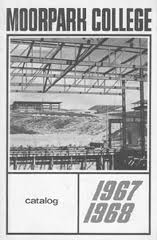In 1970, the Moorpark Community College Child Development Program, known then as the Nursery School Education Program, enrolled child development students within the Home Economics Department. The program consisted of five courses: Child, Growth and Development; Observation in the Nursery School; Child, Family and Community, Nursery School Programs; and Supervised Participation in the Nursery School. That same year, MC enrolled its first preschool students; these preschoolers joined the first community college based Head Start program in the country. Dolores Deutsch, former director of San Fernando Valley State College’s Laboratory School, enthusiastically oversaw both sets of students. Dolores remembers going door-to-door to recruit preschool students. Within a year, the Nursery School Program had grown to approximately 100 day students and100 evening students, and within three years preschool enrollment doubled in size.
With enthusiasm for the growing program, MC decided to allocate $25,000 in federal grants to expand the Nursery School Program into an Early Childhood
Development certificate program. This allowed the preschool to open a second afternoon session and the college to offer five additional classes, including a new course: Growth and Development of the Exceptional Child. The college also partnered with Camarillo State Mental Hospital to offer a Child Practitioner program, a two-year Associate of Arts degree.
During the 1970’s, MC continued to add early childhood development courses including: Parent as a Teacher, Family Dynamics in the Teaching-Learning Process, and Parent and Teacher Communications. In 1977, Head Start left and the preschool classroom transitioned into a campus laboratory school with both a morning and afternoon program. Courses continued to use the preschool classroom as a central focus of the program. In response to California state licensing requirements in 1980, MC offered a Nursery School Administration course for preschool director and owners.
A second preschool classroom, with a child care, rather than a laboratory focus, opened in 1980. Coursework focusing on child care and increasing parents’ understanding of their children was added as well. The Parent-Toddler Program began and still continues on Friday mornings. By 1989, the Parent-Toddler Program doubled in size.
After 18 years of service to the MC Child Development Department and Center, Dolores Deutsch retired in 1988. Her successor, Linda Cravens, continued her efforts and set her sights on center program expansion and accreditation. Those dreams were realized within the decade. In 1994, initial plans were drawn for this new child development center to house both the children and the community college student majors. Four years later a portion of the grant funds were allocated to expand the original child development center to four rooms. That same year, the center received accreditation from the National Association for the Education of Young Children. This prestigious accreditation is awarded to only a small percentage of excellent programs.
In 2005, ground was broken on the new MC Child Development Center. Within two years, the facility was completed. The center now has five child classrooms, and adjacent observation rooms, licensed for infants through preschool; two classrooms for college instruction; a children’s library; workroom; kitchen; faculty and staff offices; and an outdoor play yard with a large covered area for outdoor classroom space.
The Child Development Center serves as a training institution for the College, and has an outstanding teaching staff that attract both quality students interested in Child Development professions as well as families who are interested in quality early childhood education for their children. Student teachers are expected to be careful observers of children’s development. They are assigned to a regular classroom where they receive intensive mentoring from the highly qualified teaching staff and Moorpark College Child Development Instructional Faculty. In addition, the observation rooms are utilized by a variety of campus disciplines for child study and research.
Thank you to Dolores Deutsch and Kristi Almeida-Bowin for their help in creating this historical record.
